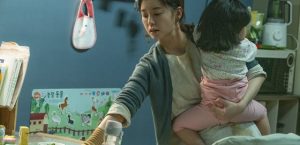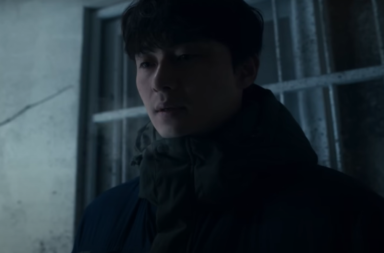
South Koreans and consumers of Korean entertainment are not newcomers to news about gender-based violence and exploitation. The late Goo Hara was blackmailed by her ex-boyfriend who threatened to release a sex tape of the two that was taken without her consent. Earlier this year, the Nth room case shocked Korea as well as the rest of the world. These cases are only a few examples of the sexism that exists in South Korea, which is the main topic of the film Kim Ji Young, Born 1982. Released last fall, the movie demonstrates how prominent sexism is, through the life of the protagonist Ji-young. However, the film ends on a bright note with Ji-young finding and expressing her individuality with the assistance of those around her. Kim Ji-young, Born 1982 shows in a thoughtful and subdued manner how prevalent gender roles and discrimination are in South Korean society and the consequences they have on ordinary women.
The movie follows the everyday life of Ji-young (Jung Yu-mi), who is an ordinary housewife. Her husband, Jung Dae-hyun (Gong Yoo), notices that Ji-young sometimes speaks as if she has been possessed by other women present in her life, though Ji-young never remembers herself doing so. As the film progresses, however, the audience learns that these outbursts may be both a consequence and reaction against the sexism that Ji-young has dealt with her entire life.
This review contains spoilers
The movie demonstrates how pervasive sexism is, through many subtle details. One such example is the depiction of workplace discrimination and harassment against women in Korean society through the experiences of Ji-young’s husband and former coworkers. In flashbacks, Team Leader Kim (Park Sung-yeon), a working mom who used to be Ji-young’s boss and role model, is seen as strict and intimidating by everyone. She directly challenges sexist comments about working moms made by another male coworker, but in the end it is obvious that she is still forced to laugh off these comments in order to fit into the male-dominated workplace. Her decisions surrounding the care of her own child are topics of gossip; even in households where both parents are working, women are expected to be the primary caregiver.
Indeed, in Korea, even in dual-earning households the primary caregiver of both children and elders is expected to be the wife. As men were traditionally the sole breadwinners of the household, they are exempt from domestic duties, according to traditional Confucian gender ideology. Though policies and programs have been introduced and upgraded in recent years to encourage fathers to take a more active role in caregiving, many men do not participate in them. In the film, a conversation between Dae-hyun and his coworkers reveals the social stigma surrounding men taking parental leave. Though Dae-hyun suggests using his parental leave so that Ji-young can focus on restarting her own career, it is Ji-young who ends up being berated by her mother-in-law for seemingly blocking the progression of her husband’s career. In opposition, Ji-young giving up her own job to be a stay-at-home wife and mother is accepted as natural and is even expected.

Along with workplace discrimination, the movie also highlights instances of workplace sexual harassment. At Ji-young’s former workplace, a spycam is found in one of the stalls in the women’s bathroom. It is only discovered when a male colleague informs one of the women that there is a spycam; he only learned about it because another male coworker had found pictures of the women online and shared pictures with him. The women wonder why the male colleague did not report the photos when he came across it and instead chose to share it with other men. Earlier in the film however, even Dae-hyun and his coworkers have a “boys will be boys” attitude and brush over how their other coworkers may be watching and sharing sexual pictures of women with each other. The failure of these men to interfere points to a broader system of normalized sexual harassment against women in South Korea.
The spycam epidemic and the prevalence of digital sex crimes in South Korea is an issue that has made headlines around the world. The movie does not highlight the crimes themselves, but instead focuses on the daily psychological burden that they place on women. The women at the workplace have to go to work with the knowledge that some of their male coworkers have seen pictures and videos of them that were taken without consent; Ji-young carefully checks a public bathroom when she enters it, but still decides not to use it. Indeed, gender discrimination permeates the daily lives of women in a multitude of ways by invading their professional and personal spaces.

However, the film places an emphasis on the fact that sexism is not a problem limited to individuals, but that it is a problem that is entrenched in Korean society and its norms. Ji-young’s dissociative episodes are one such example. Throughout the film, Ji-young’s dissociative episodes are when her frustration and anger are finally voiced. These outbursts are both a consequence of and a rebellion against Ji-young being pigeon-holed into a life as a filial wife and daughter. The women who seem to be speaking through Ji-young, including her mother and a former friend, are ordinary women who have also experienced everyday sexism. Though Ji-young is the main character of this film, her experiences are actually a common narrative for many women in Korea.
Ji-young’s interactions with her family are also an example of widespread sexism in Korea. As a child, Ji-young and her older sister, Eun-young (Gong Min-jung), are asked to set the table while their younger brother, Ji-seok (Kim Sung-cheol), rests. While doing so, they overhear their maternal grandmother apologize to their mother who had to work to support her brothers. The two daughters of the house are tasked with domestic chores from a young age, but this confinement is part of a traditional gendered ideology, as demonstrated by the sacrifices of their mother who had to give up her own dreams of being a teacher to support her brothers’ education. Though their mother often speaks out on behalf of her two daughters, they are all still part of a patriarchal society where women take a subservient role to their fathers, husbands, and brothers. Ji-young’s father favours his only son over his two daughters though he is often surprised when this fact is pointed out to him; it comes without question that his only male heir should be valued, often at the unconscious expense of his daughters.
In one scene, Ji-seok buys bread with red bean paste filling for Ji-young because their father said it was her favourite kind. When he gives it to her, however, she mentions that she has never liked it and that it had always been Ji-seok’s favourite. The scene is a powerful moment of understanding for Ji-seok and a reminder for the viewer that Ji-young has always been second fiddle to her brother. Though individual blame could be shifted to their dad, his unconscious favouritism of Ji-seok is simply one example of sexism that is embedded in Korean society.

These are some of the ways that the film incorporates many subtle details and stories to highlight how traditional gender ideology affects women in their everyday lives. The resulting sexism leads to women facing workplace discrimination and sexual harassment, and even in the domestic sphere they are overlooked for their male counterparts. However, by the end of the film Ji-young is able to find and express her individuality with the help of those around her. Her husband and family members recognize her suffering and help her break free from it, which is delicately reflected in the cinematography.
Despite Ji-young being pushed into her roles as a daughter and mother, by the end of the film she finds her own sense of self with her family’s help. The most obvious example is when Ji-young finally meets the psychiatrist that Dae-hyun has been encouraging her to see. Her realization about her dissociative episodes, and her taking the steps to get help would not have been possible without Dae-hyun, as well as her family. Ji-young’s story is a microcosm that suggests the widespread ideological and systemic changes required to correct sexism in Korean society. The implicit and explicit sexism that everyday women experience can only start to be changed when more people realize its severity and start to take action.
In one scene, Ji-seok gives Ji-young a pen that their father had gifted to him. Ji-young had wanted the pen for years, and when Ji-seok finally hands it to her it signals Ji-seok giving Ji-young a tool to express herself. He has always held a position of privilege over his sisters, and by giving Ji-young a pen he is encouraging her to speak up about her experiences being overlooked by the men around her.

The cinematography also beautifully tracks this transition throughout the film. One of the first scenes in the film has Ji-young trying to catch a breath of fresh air on her balcony, but before she can fully enter the sunlight, her child cries and she has to rush back in. She is not afforded time for herself and her own interests and is defined by her role as a mother. Ji-young is also often framed in blue, especially in her own kitchen. A place that symbolizes her domestic duties, it is also a place that causes her the most despair. When she is shown in the kitchen, the dark blue that surrounds her indicates her depression resulting from the deprivation of expressing her individuality.
Once Ji-young starts to heal and begins articulating herself as an individual, she is able to shed this sadness away. One of the last scenes in the movie shows Ji-young once again on her balcony, but this time standing fully in the sunlight without anyone calling for her. The background behind her is a dark blue that transitions into lighter colours and into a white directly behind Ji-young. The scene reflects Ji-young’s escape from her darkest days; by finding and expressing her own voice, she has found peace. It is a hopeful and comforting conclusion for both Ji-young and the audience.
Kim Ji Young, Born 1982 is a subtle but moving depiction of the sexism that ordinary women in South Korea face. Everyday occurrences that Ji-young faces indicates the prominence of gender roles and discrimination, though the film suggests that change is possible and that it does not have to be through drastic means.
(Women of Asia: Globalization, Development, and Gender Equity edited by Najafizadeh and Lindsey (2018), BBC, The Straits Times. Images via Lotte Entertainment, Mongkol Cinema)


